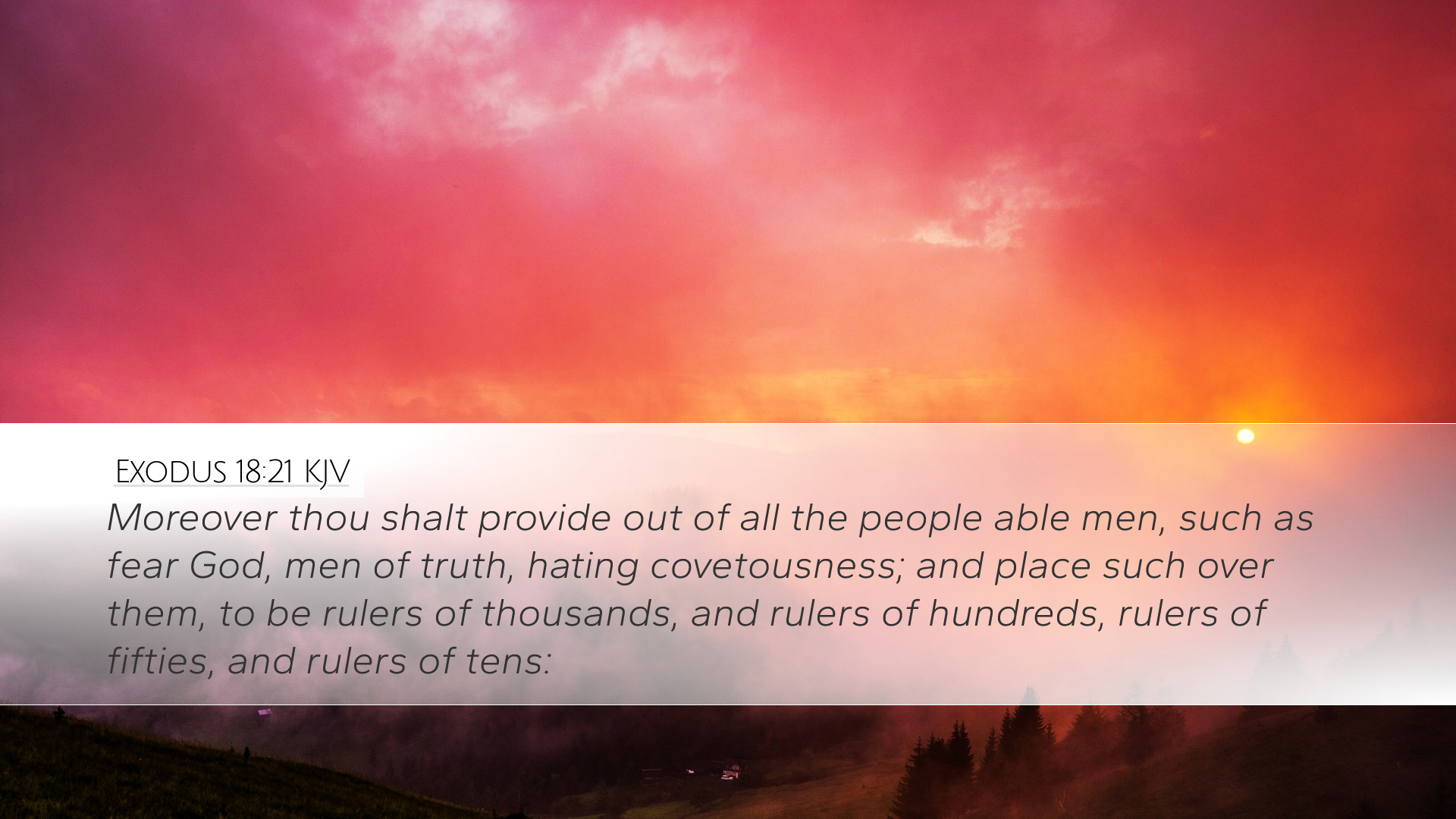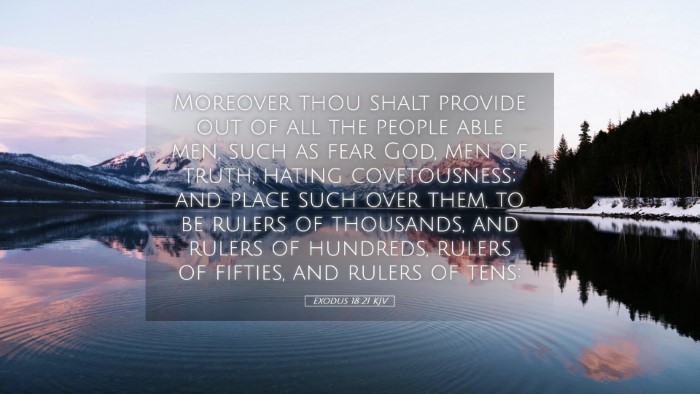Exodus 18:21 - Comprehensive Commentary
Verse Context: Exodus 18:21 states, "Moreover, you shall select from all the people able men, such as fear God, men of truth, hating covetousness; and place such over them to be rulers of thousands, rulers of hundreds, rulers of fifties, and rulers of tens." In this verse, Jethro advises Moses on establishing a system of governance to aid in the administration of justice and decision-making among the Israelites.
Insights from Public Domain Commentaries
Matthew Henry's Commentary
Matthew Henry emphasizes the practical wisdom imparted by Jethro, Moses' Midianite father-in-law. He points out that Moses was overwhelmed by the demands placed upon him, serving as both a spiritual and temporal leader. Jethro’s advice underscores the need for delegation in leadership—highlighting that no one person can meet all the needs of a community.
- Leadership Qualities: Henry notes the specific qualities that Jethro advises Moses to seek in leaders: they must be competent, God-fearing, honest, and free from greed. This establishes a foundation for righteous governance.
- Structure of Leadership: The suggestion to create ranks (thousands, hundreds, fifties, tens) shows a well-organized society, promoting accountability and efficiency in leadership.
- Delegation for Sustainability: Henry stresses that this model promotes sustainability, enabling leaders to remain focused on more crucial spiritual matters. This is an essential principle for any ministry.
Albert Barnes' Notes on the Bible
Albert Barnes provides an exposition on the significance of Jethro's counsel, stating that it reflects God’s order in society. He highlights the importance of choosing leaders who can manage the multitude and provide wise counsel, thus facilitating a just and efficient governance structure.
- Appointing Leaders: Barnes points out that the selection of able men indicates a careful and deliberate choice involving discernment. This is essential for ensuring leadership integrity.
- Divine Principles of Leadership: He elaborates on how the outlined principles for choosing leaders correlate with God's expectations for leadership in both spiritual and secular realms. The integration of divine qualities into the selection process ensures that leadership is aligned with God's will.
- Accountability in Leadership: Barnes underscores the necessity of accountability, explaining that leaders must be accountable to God and the people they serve, reinforcing moral and ethical governance.
Adam Clarke's Commentary
Adam Clarke delves into the theological implications of Jethro's advice. He posits that this moment signifies a pivotal point in the development of Israel's national identity and governance. Clarke suggests that the establishment of a structured leadership system was essential for the Israelites, especially as they transitioned into a large nation.
- Historical Context: Clarke reflects on the historical context of this advice and its necessity as Israel had grown from a family into a large nation under Moses' leadership. The well-being of the community depended heavily on effective leadership.
- Character of Leaders: He reaffirms the need for leaders to embody the attributes of godliness, truth, and integrity. The emphasis on these traits serves as a moral compass for governance.
- Implications for Modern Leadership: Clarke leaves the reader to ponder the implications of such counsel in contemporary contexts. He challenges modern leaders, especially those in spiritual and community realms, to uphold these characteristics.
Theological Reflections
This verse encapsulates significant theological principles concerning governance and leadership in the context of faith. It emphasizes that God desires order and structure in leadership among His people:
- Godly Leadership: The call for leaders who "fear God" implies that a reverent relationship with God is foundational for effective leadership.
- Moral Integrity: The qualities of honesty and a disdain for greed are critical. Leaders are to be seen as representatives of God’s justice and morality, thus earning the respect and trust of their congregation.
- Community Involvement: Understanding that governance is not solely the responsibility of one individual; rather, it involves a community working together to uphold justice, mirroring the body of Christ where different members fulfill various functions.
Practical Applications for Today
For pastors, students, theologians, and scholars, Exodus 18:21 serves as a blueprint for effective ministry and community leadership:
- Delegation: Leaders should not attempt to fulfill every role themselves. Empowering others within the ministry allows for more comprehensive and effective service.
- Mentorship: Observing Jethro’s role, experienced leaders should mentor new leaders, guiding them in the qualities and practices necessary for effective leadership.
- Continuous Qualification: Leaders must continuously evaluate the qualifications of those in leadership and ensure they adhere to the biblical standards of integrity and faithfulness.
- Community Focus: Churches should strive for community-oriented governance, where the needs of congregants are met collectively, fostering a spirit of collaboration and support.
Conclusion
Exodus 18:21 invites a deep exploration into the nature of leadership and governance rooted in biblical principles. The verse not only provides insights into the early structure of Israelite governance but also serves as a guiding framework for contemporary leadership within the faith community. As theologians and leaders dissect this scripture, they are reminded of their responsibilities, the importance of shared leadership, and the necessity of a character reflective of God’s righteousness.


